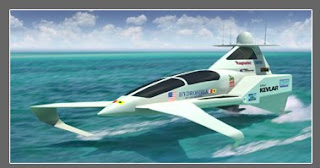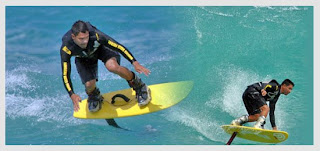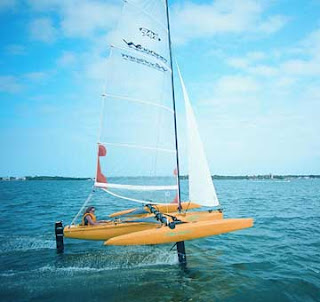 What if your boat could ride the waves... and ride the winds too? A Hydrofoil is a boat with wing-like foils mounted on struts below the hull. As the craft increases its speed the hydrofoils develop enough lift for the boat to become foilborne - i.e. to raise the hull up and out of the water.
What if your boat could ride the waves... and ride the winds too? A Hydrofoil is a boat with wing-like foils mounted on struts below the hull. As the craft increases its speed the hydrofoils develop enough lift for the boat to become foilborne - i.e. to raise the hull up and out of the water. Purpose Of The Hydrofoil
There are many purposes for hydrofoils. The main reason people install hydrofoils onto their watercraft is to decrease the drag of the boat as it travels through the water. By decreasing the drag, the watercraft is able to travel at higher speeds while burning less fuel. This makes use of the watercraft much more economical and provides a smoother, more comfortable ride because the watercraft rides above the reach of most of the waves. ig

Another reason to use hydrofoils is because they are fun. When used on sail boats, hydrofoils can increase the top speed by quite a bit. Once the hull of the sail boat is out the the water the drag from the water is much less. Simply explained, there is less surface area "rubbing" on the water to slow the boat down. This means that even with gentle winds, a small boat can really get moving.
How Do Hydrofoils Work?
Most hydrofoils lift the watercraft that they are supporting in the same way that airplane wings keep the plane supported in the air. With enough lift on the water foils, the hull of the watercraft is lifted out of the water. Foils create lift when the water traveling over the top surface of the foil goes faster than the water traveling over the bottom.

Most foils are positioned from parallel to the hull to 5 degrees up. They are angled from side to side to allow a portion of the foil to come out of the water as the boat rises, thus allowing the boat to maintain stability by keeping a portion of the foils in submerged in the water.
The main reason that hydrofoils work is because of Newton's Third Law:
for every action force there is an equal and opposite reaction force.
In layman's terms, this means that for every unit of force that the hydrofoil is pushing down on the water, the water is pushing back with the same force. This resistive force is what supports the weight of the watercraft on the hydrofoil.

Hydrofoils are now being applied in multiple marine applications. Surfers have Surfboards with hydrofoils, better suited for big waves further out to sea, so do Sailboats, Kayaks, Aqua-scooters and lots more.
To understand this better follow the links below. These will lead you to videos of how a hydrofoil works on a sailboat, surfboard, aqua-scooty and kayaks. Hope you enjoy... as you watch them fly!
http://www.youtube.com/watch?v=oQbECYuCzWs&feature=related
http://www.youtube.com/watch?v=9FXuBkAVU6g&feature=related
http://www.youtube.com/watch?v=FvFkqs-saB8

1 comments:
Good collections and interesting links on hydrofoils. Thanks.
Post a Comment